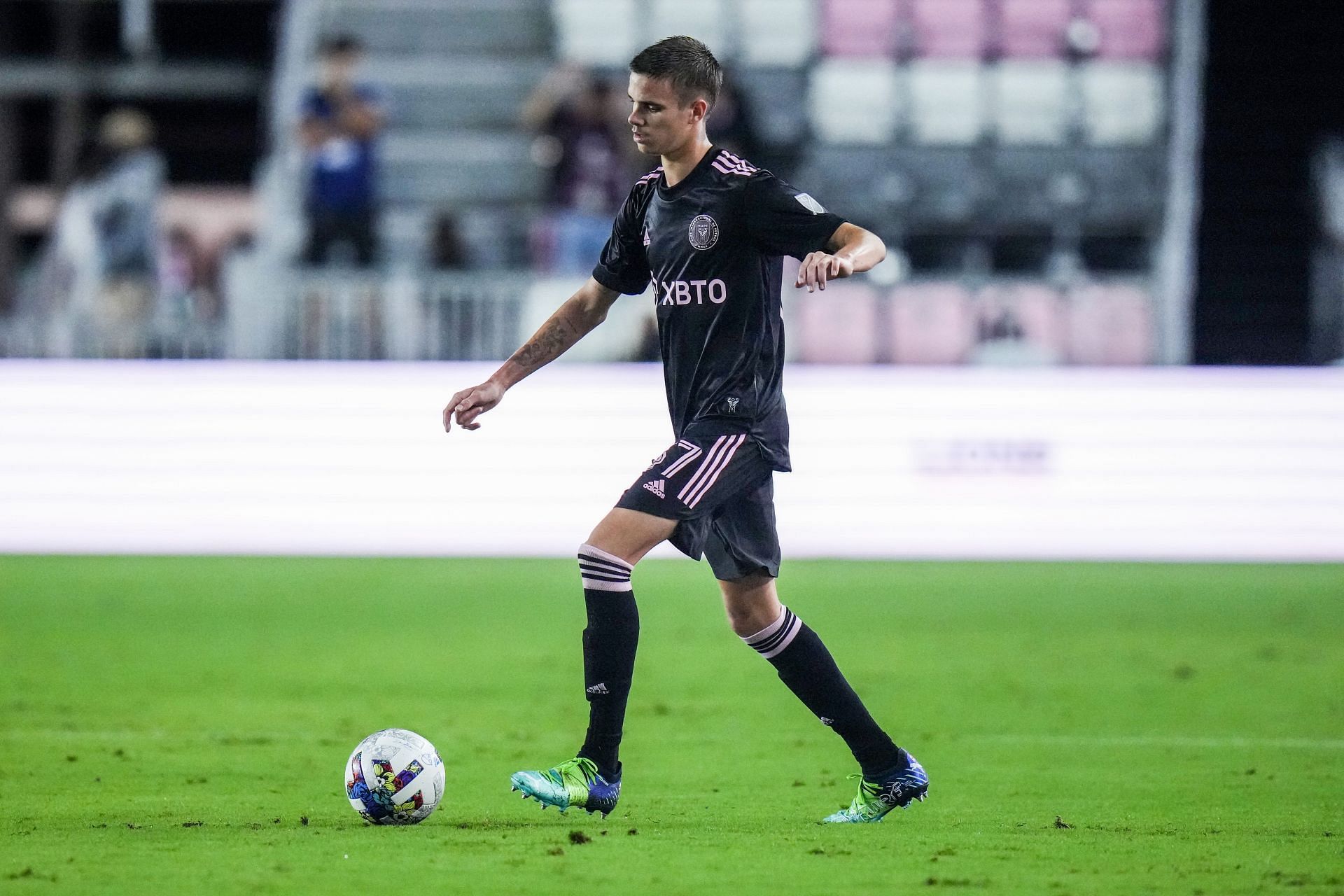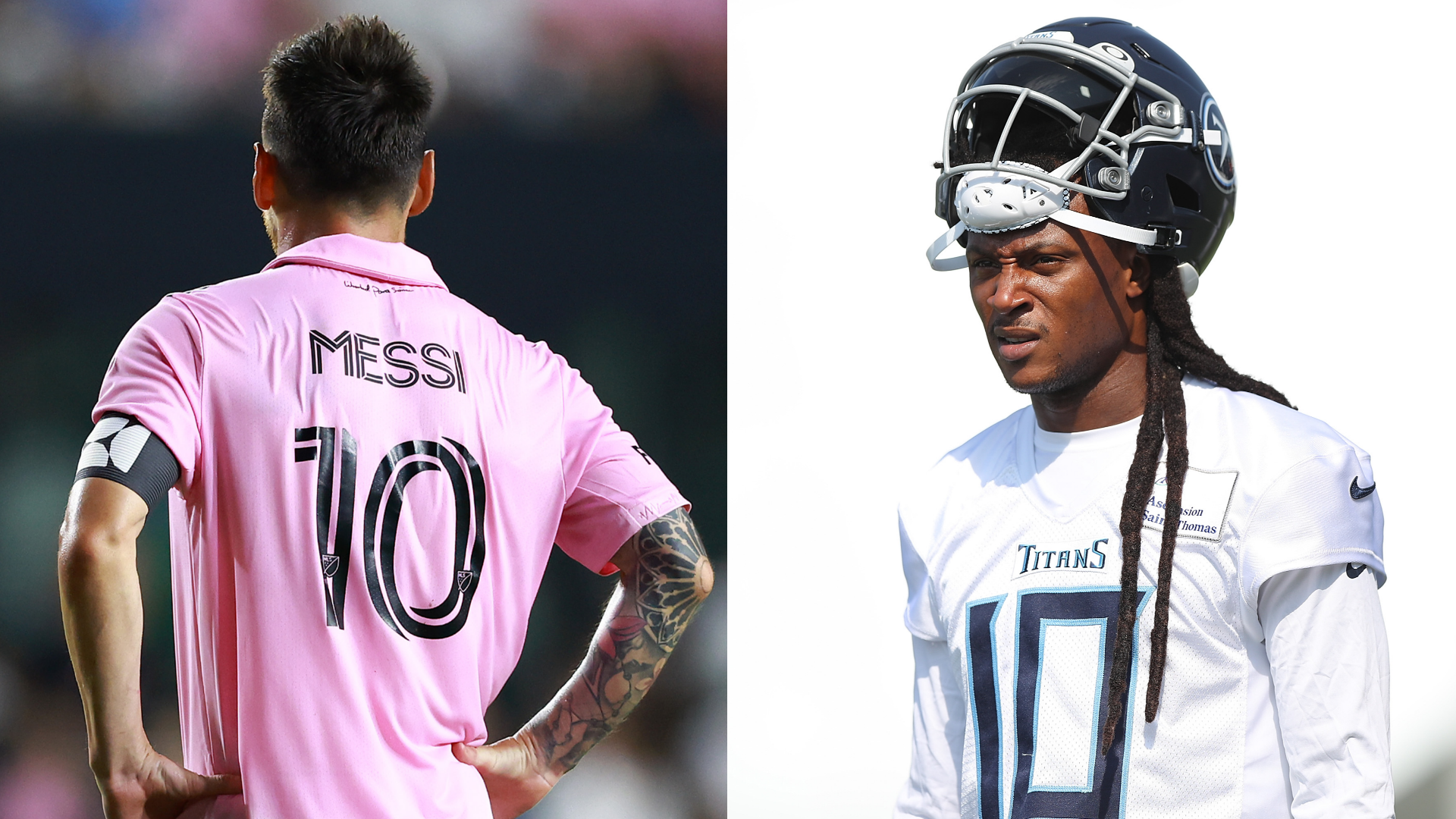An evening with David Beckham: Signing Messi, Cantona’s praise and why Mum is always right
It felt inevitable, with David Beckham taking questions on the main stage, that the conversation would turn to his new working relationship with Lionel Messi.
What he may not have expected was that a member of the audience would challenge him as to why he had recruited the seven-time Ballon d’Or winner for Inter Miami rather than Salford City, the other club Beckham part-owns, who are based near Manchester and play in the fourth tier of English football.
“Yes, I am part-owner of Salford City,” began Beckham. “And Salford is a great place. But, obviously, Argentina is closer to Miami than Salford. I think that was quite a pull for Leo…”
That was the moment Beckham stopped himself from saying any more, with a tell-tale smile that told his audience he might have let too much slip already.
Officially, Messi’s move to Miami’s MLS team is still meant to be a secret, of sorts, when Beckham and his colleagues are working on the big reveal, to be announced (possibly) this week. Something special is being planned because, well, it has to be pretty special when the player in question is Messi — 2022 World Cup winner, superstar, international football royalty.
It is just difficult to keep up the pretence when, unofficially, the secret is out and Messi has already confirmed that, rather than returning to long-time club Barcelona, he is leaving Paris Saint-Germain to sprinkle his magic over Major League Soccer.
“A couple of weeks ago, I woke up to about a million messages on my phone,” said Beckham. “I was thinking, ‘What’s gone off? I don’t usually get this many messages’. All of a sudden, I hear Leo has come out and announced he’s coming to Miami. Obviously, it wasn’t a surprise to me.
“I have always said, from the word go, that if I had the opportunity to bring the best players in the game to Miami, at whatever time of their careers, I would do that. I have always made that commitment to our fans.
“So when I hear that one of the best players — if not the best player — who has won everything in the game, who is still a great player, still young and still doing what he’s doing, wants to play for my team, it’s a massive moment for us.”
These were Beckham’s first public words about Messi’s signing and they were delivered at St Johns Wood United Synagogue in north London as part of a revealing and sometimes emotional ‘Lessons In Leadership’ conversation for the newly-established Lira Winston Fellowships.
Lady Winston, a renowned Jewish educator, died in 2021. Her son, Ben, is a friend of Beckham’s and a co-executive producer of U.S. TV’s The Late Late Show With James Corden.
All of which brought nearly 700 people to the synagogue for a 90-minute question-and-answer session that served as a reminder how, 10 years after he retired from playing, Beckham’s appeal extends far beyond football.
Yes, there were questions about his days at Manchester United, Real Madrid, LA Galaxy, AC Milan, PSG and all the moments that helped to shape Beckham’s professional life, with 115 appearances for the England national team.
We heard about the red card against Argentina in the 1998 World Cup and how, all these years later, it still grieves him. “I still think about it, most weeks,” said Beckham. “Without doubt, it still affects me.”
There were nostalgic memories about the free-kick goal against Greece that took England to the next World Cup and re-established him as a national hero.
But there were also questions from business people wanting professional advice. There were members of the audience asking for Beckham’s views about the good and bad of social media. One guy wanted to debate what had gone wrong at United since Sir Alex Ferguson’s 2013 retirement. But there was also a mother asking for help with how to balance her sons’ football dreams with school life.
Beckham flashed that gleaming smile and addressed the young boys who were sitting with her. “Remember,” he said, “Mum’s always right.”
Just a few minutes’ walk from the Abbey Road zebra crossing, made famous by The Beatles’ album cover, there were also reminders that the man in question, now a 48-year-old father-of-four, once experienced his own form of Beatlemania.
One woman’s voice quivered as she was handed the microphone and given the opportunity to ask a question of the man who captained England for six years. It was, she explained, “emotional and very special”.
Then there was the story Beckham told about his famous goal against Wimbledon when the midfielder, then a fresh-faced 21-year-old, tried his luck from just inside his own half and scored from 60 yards.
Everyone remembers the ball looping in, the flailing arms of the beaten goalkeeper and the triumphant look on Beckham’s face, arms outstretched. What people might never have heard about was the reaction in the away dressing room of Selhurst Park afterwards and what it told us, specifically, about Ferguson.
“One of my heroes was Eric Cantona,” said Beckham. “He didn’t say much, Eric. But he came up to me after the game. ‘David… what a goal’. That was almost as good as actually scoring it.
GO DEEPER
‘Hello, I am Eric.’ An interview with Cantona
“I went up to the boss. I thought he was going to say, ‘Great goal’ and put his arms around me. He said, ‘Straight on the bus — and don’t talk to anyone’. But that was his way of protecting me. He didn’t want me speaking to any media because he knew what that goal was going to do.”
Beckham went on to become one of the most famous people on the planet, aka Goldenballs, not just as a footballer but as a leader of fashion and culture (though he did admit regretting his hair being in cornrows on all the photographs of him meeting Nelson Mandela).
That fame, Beckham acknowledged, led to some tense exchanges between himself and Ferguson, especially after he started dating Victoria Adams, then a pop star with the Spice Girls and now his wife of 24 years.
“I always felt I would start my career at Manchester United and end my career at Manchester United,” said Beckham. “I had no intention of leaving at any point and I didn’t want to play for any other club.”
So how did it feel, in the summer of 2003, when he found out Ferguson had decided to sell him? “For the next three years, I couldn’t even watch United on television. Being at United, and supporting them, for as long as I had, it was obviously upsetting.“
The theme of this talk was leadership and, however strained it became with Ferguson, it was noticeable how much respect there was in Beckham’s voice when he spoke about his former manager.
He also mentioned how, growing up, it was another form of tough love he experienced from his father, Ted, who worked as a gas fitter. How tough exactly? “I used to end up in tears every time I got in the car after games. However I played, he (Ted) would always pick out the things I hadn’t done right,” said Beckham.
“The only time I can remember my dad turning round to me and saying, ‘Boy, you’ve made it’ or, ‘Boy, you’ve done well’, was when I won my 100th cap for England.”
Don’t take this the wrong way. He was glad it had been that way, he explained, because it had helped him to create the strength of character that meant he could cope throughout the most challenging times of his career. Because, let’s face it, there were times when Beckham was a hate figure.
To illustrate this point, Beckham was reminded how his kick at Argentina’s Diego Simeone at France ’98 had led to him being vilified in the tabloid newspapers.
The Daily Mirror’s front-page headline — 10 Heroic Lions, One Stupid Boy — was flashed up on the screen behind him. So was the mocked-up dartboard, again in the Mirror, that had Beckham’s face as its centrepiece. Even worse, there was the effigy of Beckham that appeared in a noose outside a London pub. And, a quarter of a century later, it seems almost unthinkable that the coverage could be so vicious.
Beckham talked about how glad he is that, in today’s world, there is more of an understanding about mental health issues.
“It was tough, but it was tougher for my family than me,” said Beckham. ”I’m trying not to get emotional, but that was what worried me more than anything else.
“I remember my granddad calling me and saying, ‘David, I’ve got people knocking on the door saying you’ve let the whole country down and let your whole family down, what shall I say?’.
“I couldn’t drive around London. I couldn’t walk around London. I couldn’t go to restaurants. I couldn’t go to bars. Even my friends didn’t want to go out with me. They knew I would get abused. If I stopped at traffic lights, people would hit, or spit at, my car.
“Those kinds of things were happening to me, daily, for quite a few years.”
These days, Beckham’s devotion is to the team who sit bottom of the Eastern Conference table after 19 games of this MLS season.
It has been, he said, one of the more challenging yet fulfilling experiences of his career, given that Inter Miami were created only five years ago. A new stadium, Miami Freedom Park, is being constructed for them to play in and Beckham, trying not to mention The Big Messi (Non) Secret too often, settled on saying there were “exciting times ahead.”
As for his own form of leadership, Beckham talked about the values of hard work, of leading by example, never allowing complacency to set in and being so dedicated to his profession that Victoria cried when he was invited to join PSG, leaving the family home in London, at the age of 37.
It touched him, he said, that somebody as hard to please as Roy Keane, his former captain at United, would often eulogise about his work ethic and professionalism, in contrast to the suspicion of Ferguson that Beckham might be distracted by his fame and lifestyle.
Disappointingly perhaps, Beckham was not asked how difficult it had been for him to remove Phil Neville, his long-time friend and former United team-mate, as Miami manager last month. Or, indeed, the controversy of being an ambassador for host nation Qatar in the most recent men’s World Cup.
But there were other examples of what he thought constituted good and bad leadership.
One topic of conversation, returning to 1998 for the final time, was Glenn Hoddle, then England’s manager, publicly blaming him for the team’s World Cup exit, as the 10 men went on to lose that last-16 tie with Argentina in a penalty shootout. What kind of leadership was that? “I only heard what Glenn said recently,” said Beckham. “I was surprised, but people say things in the heat of the moment and everybody was hurting at that point.”
Beckham has been reminded of those comments because he is helping Netflix put together a biopic of his life.
“There was one leader in that dressing room,” he added. “I was obviously upset. (Arsenal defender) Tony Adams put his arm around me and said, ‘Son, don’t worry about it. You made a mistake, move on’. He was unbelievable with me, and I will never forget that moment.”
GO DEEPER
‘He’s like a god here’: What Lionel Messi will get in Miami
(Top photo: Ira L. Black – Corbis/Getty Images)



